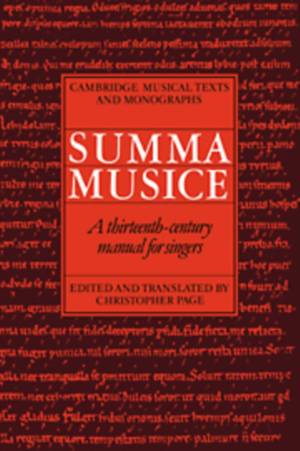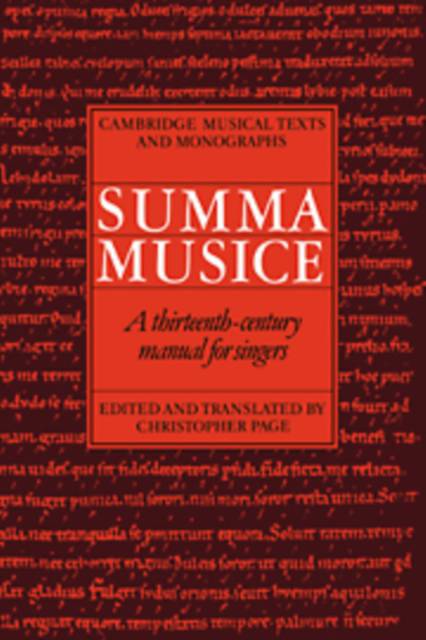
Bedankt voor het vertrouwen het afgelopen jaar! Om jou te bedanken bieden we GRATIS verzending (in België) aan op alles gedurende de hele maand januari.
- Afhalen na 1 uur in een winkel met voorraad
- In januari gratis thuislevering in België
- Ruim aanbod met 7 miljoen producten
Bedankt voor het vertrouwen het afgelopen jaar! Om jou te bedanken bieden we GRATIS verzending (in België) aan op alles gedurende de hele maand januari.
- Afhalen na 1 uur in een winkel met voorraad
- In januari gratis thuislevering in België
- Ruim aanbod met 7 miljoen producten
Zoeken
Summa Musice
A Thirteenth-Century Manual for Singers
€ 224,95
+ 449 punten
Omschrijving
How did medieval musicians learn to perform? How did they compose? What was their sense of the history and purpose of music? The Summa musice, a treatise on practical music from c. 1200, sheds light on all these questions. It is a manual for young singers who are learning Gregorian chant for the first time, and provides a compact but comprehensive introduction to notation, performance, and composition, written in a mixture of Latin prose and verse. More than that, however, it is also an introduction to medieval culture: what educated people believed to be worth knowing about music, how they reasoned when they discussed musical questions, the nature of musical thought and how it was expressed. There has been no edition of the Summa musice since 1784, when Gerbert published a very faulty text. Christopher Page's book provides a completely new edition of the Latin text taken from the only surviving original copy, together with an English translation. Both texts are copiously annotated and introduced by an authoritative and illuminating editorial commentary.
Specificaties
Betrokkenen
- Uitgeverij:
Inhoud
- Aantal bladzijden:
- 294
- Taal:
- Engels
- Reeks:
Eigenschappen
- Productcode (EAN):
- 9780521404204
- Verschijningsdatum:
- 30/08/1991
- Uitvoering:
- Hardcover
- Formaat:
- Genaaid
- Afmetingen:
- 152 mm x 229 mm
- Gewicht:
- 603 g

Alleen bij Standaard Boekhandel
+ 449 punten op je klantenkaart van Standaard Boekhandel
Beoordelingen
We publiceren alleen reviews die voldoen aan de voorwaarden voor reviews. Bekijk onze voorwaarden voor reviews.








